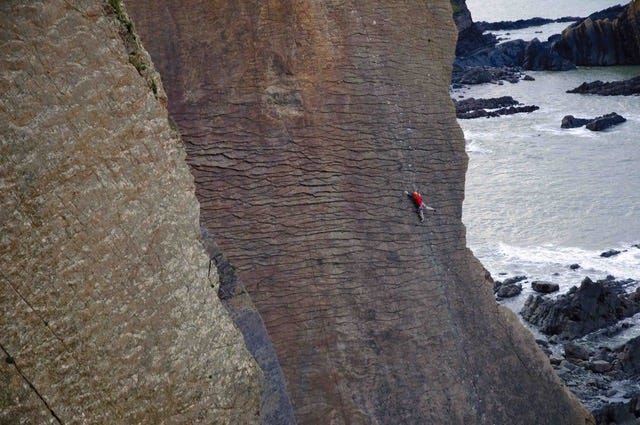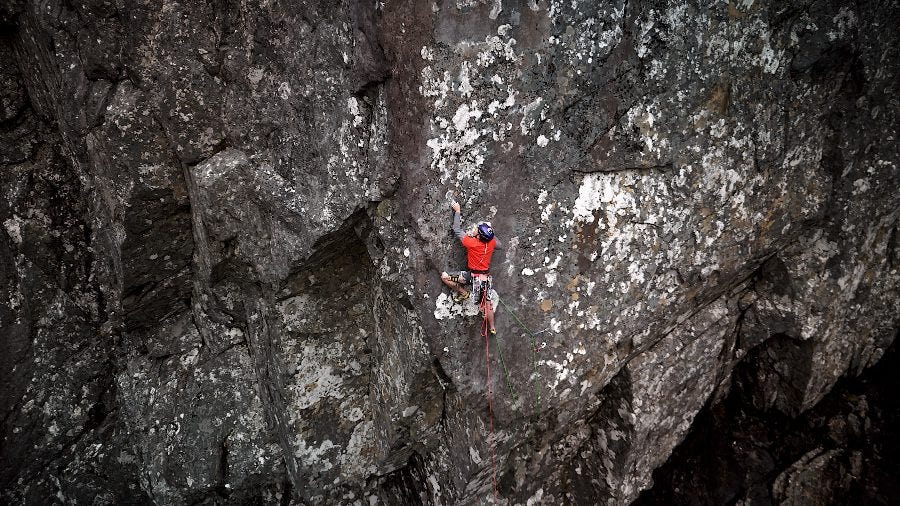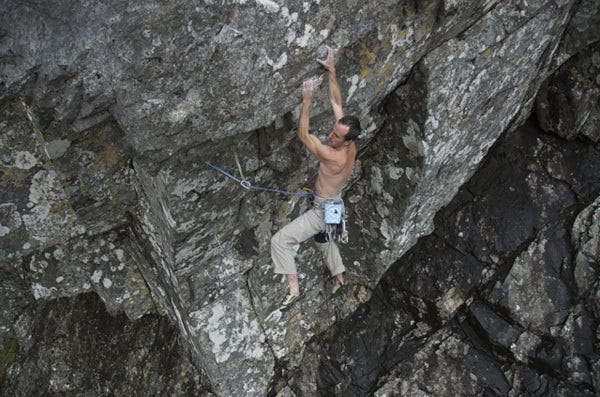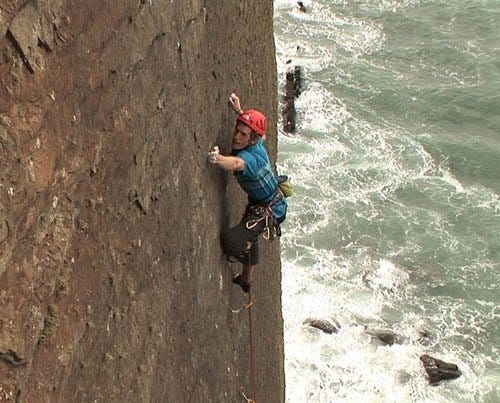Echo Wall
Despair and Redemption in British Traditional Climbing 🧗♀️
~ drama at the upper levels of British climbing ~ ego ~ hope ~ failure ~ risk
Although an esoteric tale, this piece has been written for a general readership, and treats of subjects of general human interest. I hope that you enjoy reading it. I will continue my series on language models and the value of writing this week, the introduction to which you can read here.
In the mountains of the United Kingdom, the style of rock climbing that predominates is ‘traditional’ or ‘trad’. In ‘trad’ the climber is protected from a fall only by the pieces of equipment they insert into the rock with their fingers – small metal shapes the rope gets clipped to – rather than by bolts drilled in or a rope dangling from above. By its admirers, this style is considered as the purest form of climbing, as you do not need anyone to have been up before you to make it safer. Detractors say it’s pointlessly dangerous, especially at the difficult end.
One climb at this top end of the scale is called Echo Wall, which bashes up a bulging andesite arête on the north-east side of Ben Nevis. After Scottish climber Dave Macleod got the first ascent in 2008, he untied from the rope and said, grimly, that it was ‘serious’. In the morbid euphemism of UK trad, this means if you fall, you die. The route requires physically hard climbing, and its position high in the mountains makes it a nightmare to find and lunacy to attempt. Macleod was at the time regarded as the finest trad climber in the country, having climbed Rhapsody on Dumbarton Rock in 2006, which he gave the grade E11, making it the hardest trad climb in the world. And so when he refused to give Echo Wall a grade, even though it was ‘harder than any trad route I’ve ever done’, climbers were left to chew over the implications of his pronouncements. Was this mysterious and barely-photographed wall of rock an E12? A number so high sounded absurd.
(Whole essays have been written on the grading system used in British trad climbing, but for the sake of time suffice it to say that very few climbers in the world ever get to E9 / E10. These climbs are either extremely dangerous or extremely physically demanding. At E11, they are usually both. For many years before Rhapsody, E11 seemed totally absurd, a concept without content.)
Not long after Macleod’s ascent of Echo Wall, English climber James Pearson put up a route of his own which did in fact claim the E12 grade. The Walk of Life teeters up a huge fin of compressed mud and sandstone at Dyer’s lookout in Devon. Though clearly cutting-edge, the route’s big number raised eyebrows. Pearson had a reputation as a tyro on the UK scene, doing a series of dangerous ascents on gritstone in the Peak district, and was no stranger to his routes being downgraded by other climbers attempting them after and finding they weren’t quite as bad as he’d claimed. Downgrading in climbing is a big deal, often implying that the original grader was being dishonest, inflating their own accomplishments with undeserved numbers. Eyebrows raised even further when Pearson on his blog questioned some of Macleod’s own achievements, saying Rhapsody was not as hard as The Walk of Life, despite Pearson never having completed the route.

Macleod then promptly drove from the Highlands all the way to Devon, where he climbed the Walk of Life after only a few days of practice, effectively dismissing the route by downgrading it from E12 to E9. Pearson was summarily abused by the climbing media, painted as talented but egotistical, with no deference to the ‘right way’ and the history of British climbing.
To escape the backlash, Pearson moved to France, got married, and had a family. Macleod continued his storied career. It seemed like that was the end of it: the upstart put in his place.
Yet, after some years, Pearson started to pop up again in the lower-key sections of the climbing media. He did a number of impressive ascents around Europe. He started returning to the UK and climbed Rhapsody in 2014. Echo Wall, however, remained unrepeated. It was too hard to get to, and when you were there, too hard to climb, too risky to justify. In the trad scene the climb became a meme denoting the ineffable, the unattainable.
In July 2024, eighteen years after the first ascent, news broke that Echo Wall had finally seen a second ascent. James Pearson had driven his van to Scotland, camped out beneath Ben Nevis, and worked at it over a period of a few weeks, before finally making the ascent belayed by climber (and his wife) Caroline Ciavaldini. Often you can view hard climbs as a type of redemption: the body achieves something eternal through pure formal movement on ancient rock. This body is redeemed from contingency and temporality. What is rarer is to see a climb that becomes a type of revenge: the body asserting itself over a culture and practice which has denigrated it.
Just last week, Pearson gave an interview with UKC where he said that Echo Wall is ‘hard E11’. This would have, in line with the mythos, made it the hardest climb in the world at the time. In saying this, he has resisted the urge to get one back at Macleod by giving it a big downgrade. Winning against the rock was enough; no need to do the same against the man.




